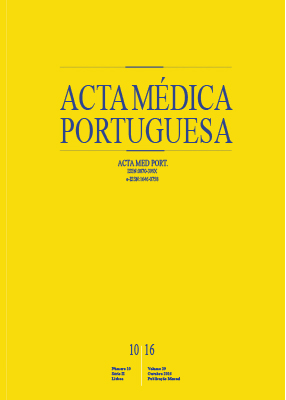Analysis of the Cochrane Review: Chromoscopy Versus Conventional Endoscopy for the Detection of Polyps in the Colon and Rectum. Cochrane Database Syst Rev. 2016;4:CD006439
DOI:
https://doi.org/10.20344/amp.7968Keywords:
Colonic Polyps/diagnosis, Colonoscopy, Indicators and Reagents, Indigo Carmine, Intestinal Polyps/diagnosis, Precancerous Conditions/diagnosis, Randomized Controlled Trials as Topic, Rectal Diseases/diagnosis.Abstract
Although colonoscopy is considered the most accurate test for the investigation of colorectal polyps, lesions ≤ 10 mm may be missed in approximately 10%. Chromoscopy may increase the detection of colorectal polyps. A systematic review and meta-analysis was performed to investigate the benefit of cromoscopy in colorectal polyps detection. Seven randomized controlled trials were included (incuding 2,727 participants) comparing polyp detection (both neoplastic and non- neoplastic polyps) in patients submitted to conventional colonoscopy or colonoscopy with chromoscopy. Chromoscopy was associated with a significant improvement in all detection endpoints (number of polyps, number of neoplastic polyps, number of diminutive polyps, number of neoplastic diminutive polyps, proportion of patients with at least one polyp and proportion of patients with at least one neoplastic polyp). However, when highdefinition colonoscopes were used in the control group, chromoscopy benefit does not seem to be significant. Besides, routine use of chromoscopy may have implications in the accessibility of colonoscopy and in the effectiveness of screening programs. Moreover, the benefit of chromoscopy in the era of high-definition colonoscopy is questionable.
Downloads
Downloads
Published
How to Cite
Issue
Section
License
All the articles published in the AMP are open access and comply with the requirements of funding agencies or academic institutions. The AMP is governed by the terms of the Creative Commons ‘Attribution – Non-Commercial Use - (CC-BY-NC)’ license, regarding the use by third parties.
It is the author’s responsibility to obtain approval for the reproduction of figures, tables, etc. from other publications.
Upon acceptance of an article for publication, the authors will be asked to complete the ICMJE “Copyright Liability and Copyright Sharing Statement “(http://www.actamedicaportuguesa.com/info/AMP-NormasPublicacao.pdf) and the “Declaration of Potential Conflicts of Interest” (http:// www.icmje.org/conflicts-of-interest). An e-mail will be sent to the corresponding author to acknowledge receipt of the manuscript.
After publication, the authors are authorised to make their articles available in repositories of their institutions of origin, as long as they always mention where they were published and according to the Creative Commons license.









